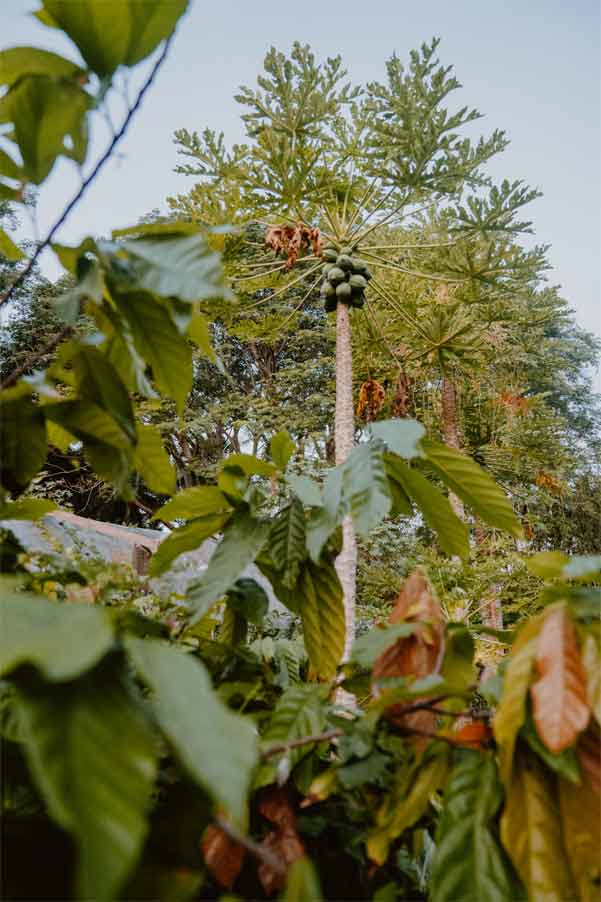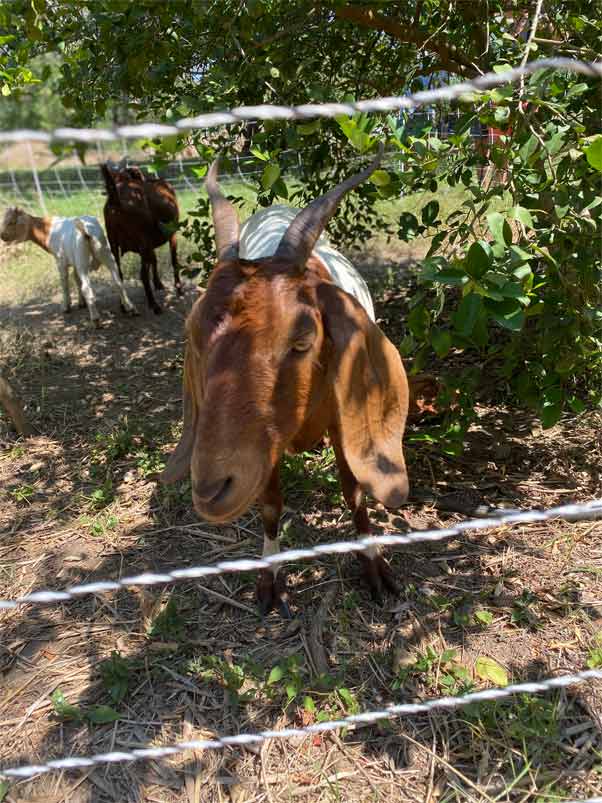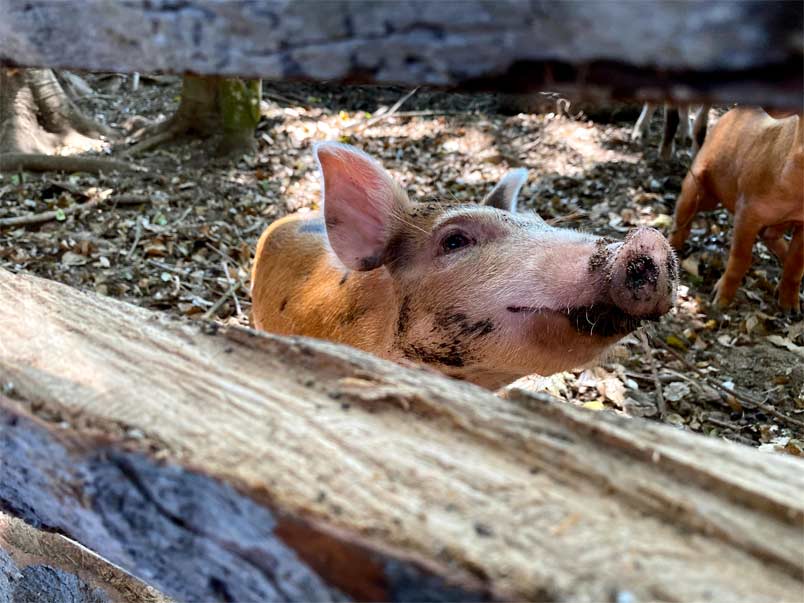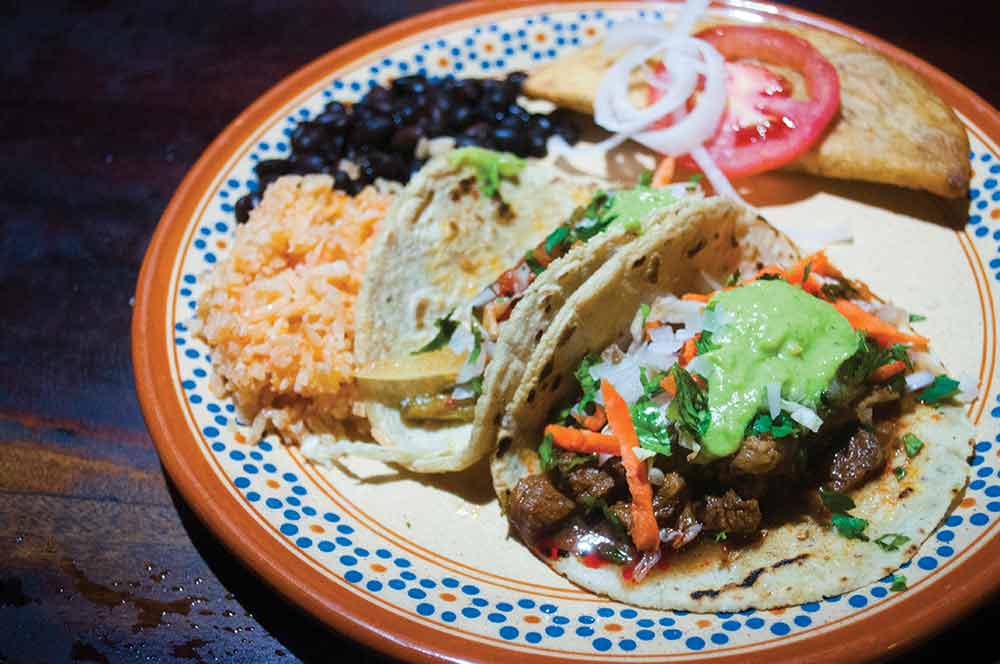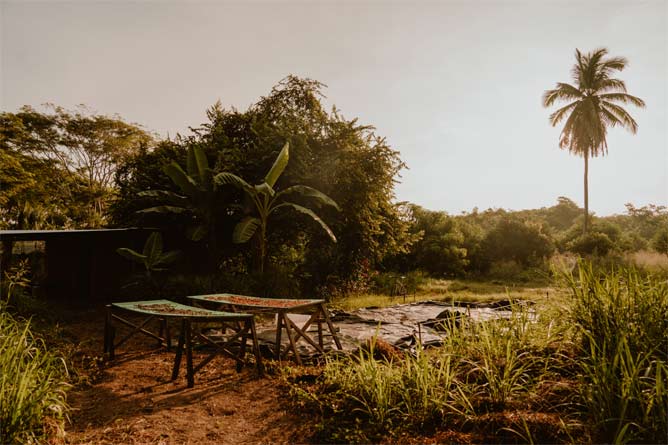At Playa Viva, farm to table means we know where each of the ingredients we serve is purchased and who that purchase supports. We buy many of our ingredients locally from Juluchuca and three other communities in our watershed. Our local ingredients include milk, cheese and eggs, coffee and chocolate, squash, beans, corn and tomatoes, and seasonal fruits like papaya, starfruit and limes.
When it comes to Playa Viva’s own farm, we focus on growing and raising nutrient-dense foods in a holistic and regenerative way. For more than a decade our permaculture team has been producing and harvesting fresh greens, coconuts, bananas, and hibiscus flowers — plus a year’s supply of tamarind every April.
What the Close Alignment of People & Animals Really Means
When I arrived in Juluchuca to Playa Viva back in November 2018, one of the first things I noticed was the number of animals raised locally, just outside the homes in town. That observation immediately signalled to me that the people who live here still live incredibly close to their food; they know that food waste from a household kitchen has a second life as a food source for their animals. And they know which animals have the highest meat-to-fat ratio, as well as how to harvest pigs, sheep, goats and chickens.
Fortunately, one of the best ways to get to know people (and discover their skill sets) is over a delicious meal. I started checking in with each house where I saw pigs. I quickly found myself leaning over a cutting board in multiple kitchens and helping women prepare salsas and tortillas to go with that weekend’s fresh carnitas, chicharones and palenques. With a wild curiosity to explore my interest in their lifestyle, the men quickly invited me to participate in the harvests, too.
There is so much to learn in these moments. An animal feels just as much as one of us does. You can see it in their eyes before you begin the harvest. These moments are often quiet, respectful, and meticulously carried out to make the experience as easy as possible for all those involved. People here in Juluchuca understand that harvesting an animal while it is stressed results in cortisol and other hormones entering the meat, and therefore, entering those who later eat the meat of that animal. Our farm team at Playa Viva and those who work with animals (whether in the field or in the kitchen) here in our community also know the difference in the quality of the meat and fat of animals raised on pasture, or del rancho, compared to those raised in confined conditions and factory farms, or de la granja.
From the perspective of our regenerative hotel and farm-to-table kitchen, it would be impossible to dismiss this knowledge.
Pigs at Playa Viva — Then More Pigs!
So, about a year ago, Playa Viva started purchasing sows (female pigs) from friends in Juluchuca and the nearby town of Rancho Nuevo. We purchased animals from families that no longer wanted to raise animals and from folks who had an interest in learning alongside us as we began to build a holistically managed pig production system.
The majority of the local pigs here are a cross between two wild boar species. They have a high meat-to-fat ratio and thus are much leaner than the pig you see when you close your eyes. In fact, most farm guests, after cooing over the 30+ piglets running around the forest, immediately ask me why our pigs are so thin.
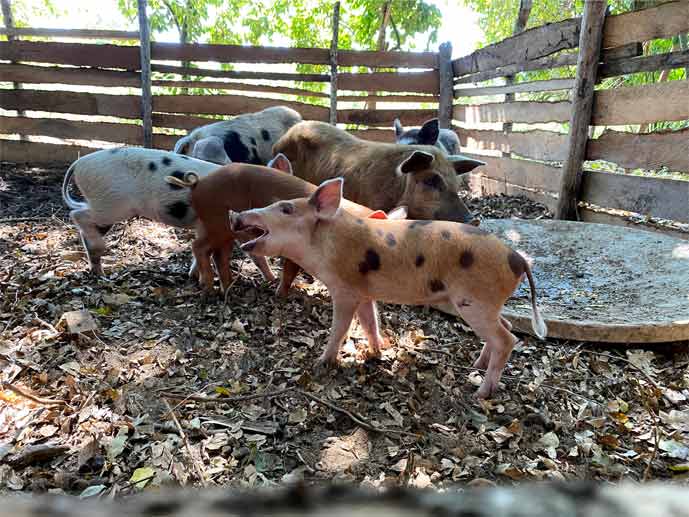
We do not intentionally fatten our animals. They are raised on food waste from the hotel kitchen, locally produced corn, and their favorite leaves, grasses and vines from our organic farm. They eat a well-balanced diet that ensures their bodies are a healthy weight and provides high nutritional levels to support their active lifestyles. Our pigs forage on roots and bugs in the soil, and run around playing with their young inside their forest-shaded chiquero, or pig pen.
Smart Permaculture Solutions Lead to Greater Benefits For All
Our permaculture team at Playa Viva lives by a principle of small and slow solutions. We discuss strategic, calculated decisions as a group before we make any changes to our farm systems. Based on this approach, we spent six months getting to know our animals: observing their adjustment to their new environment, introducing foraged greens into their diet, and identifying and collecting upcycled materials to be used to build and expand their home.
When we noticed the sows wanted a partner, we borrowed a Duroc-Jersey boar from a farmer in our community to breed with our ladies. Eight months later, we welcomed 25 new piglets to our farm and immediately noticed they were a beautiful cross between the local raza (breed), and the more industrially bred and farmed Jersey breed.
So what does this mean? It means that the genetic benefits of the local breed will come through in the new litter. The pigs will be more adapted to our climate and its fluctuations between damp soils and rainy weather to hot, dry summer days that make drinking the salty water we farm with seem unbearable. It means that they will continue to present as lean pigs and will thrive off the local food sources we have available for them. Think: an abundance of mangos a few months each year, fresh coconut water and meat all year round, and hardy mountain plants and grasses to provide important minerals and nutrients that help them thrive.
Crossing this local breed with the Jersey breed means we have a bit more control over the meat-to-fat ratio as well. The pigs will easily fatten up in the months before harvest. This allows us to not only produce organic, pasture-raised meat for our clients and hotel staff, but also creates a high quality lard that can be used in our hotel kitchen for food preparations.
Yes, We Know: Everyone Hates on Lard
Let’s talk about lard for a second because the word and its common connotations tend to build quick, negative walls for people. Animal fats are mostly saturated fat, which means they stand up better to high heat and do not break down into harmful free radicals. (This is the reason you do not cook extra virgin olive oil at high temperatures.) Reduced oxidation in animal fats means they are less susceptible to the toxins and carcinogens generated by using vegetable oil. Lard has less saturated fat than butter and it is higher in monounsaturated fats, which are good for cardiovascular health. Lard is also rich in oleic acid, the same fatty acid that is in olive oil and praised for its health benefits.
Beyond the science, in communities like ours, traditional knowledge lives on through the production, use and nutritional benefits of lard. To honor that knowledge and reinforce it becomes a responsibility of our hotel and kitchen team.
The Playa Viva Difference Appears Again
This brings us full circle — as permaculture design often does. Our team is excited to work closely with animals, taking advantage of multiple harvests from each new animal group introduced into our holistically designed farm system. Our kitchen staff feel proud to tell our hotel guests that the pork they serve was born, raised and harvested on our farm; and our meat-eating guests identify and compliment the depth and quality of flavor when they sit down to a clean plate of farm-to-table ingredients. (Although vegetarians and vegans alike also rave about our local produce.)
We invite you to come know our animals, to hold baby piglets and ask our permaculture team about the pasture spaces we build using upcycled and local materials. We promise the connections you make on the land will lend to a new appreciation for the flavors we serve.



